75 eCommerce Survey Questions to Boost Your Online Business in 2026
There are 28 million eCommerce websites out there, all competing for the same audience of 2.77 billion shoppers.
In such a crowded market, standing out isn’t just about great products anymore; it’s about great experiences.
Those experiences begin when you truly listen to your customers. Every click, every hesitation, and every review is a story waiting to be understood, a chance to turn insight into improvement.
That’s where eCommerce surveys make all the difference. They help you uncover what shoppers love, what frustrates them, and what would make them come back, again and again.
In this guide, you’ll find 75 powerful eCommerce survey questions that go beyond generic feedback forms, questions that help you understand your audience, refine your store, and build loyalty that lasts.
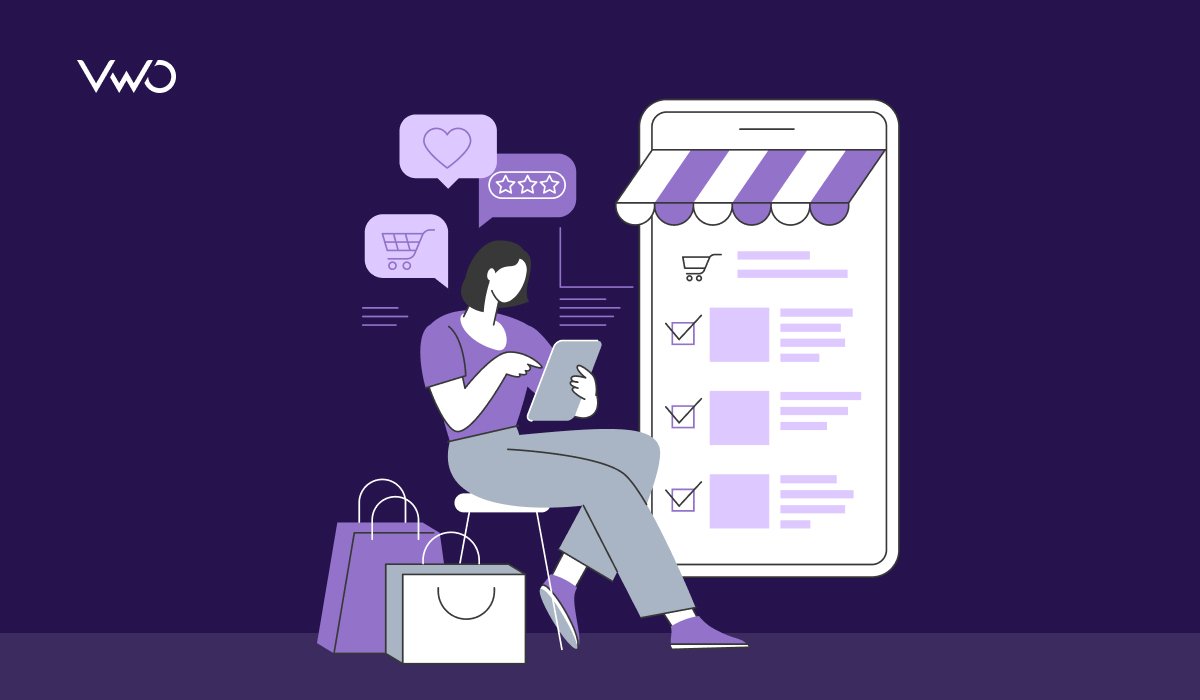
What are eCommerce surveys?
eCommerce surveys are structured questionnaires that online retailers use to gather feedback and opinions from customers at different stages of their shopping journey: before, during, or after a purchase.
These surveys capture firsthand insights on key aspects such as website usability, product experience, checkout flow, and overall satisfaction.
Typically, an eCommerce survey combines both closed-ended questions (to measure satisfaction and track trends) and open-ended questions (to uncover detailed feedback in the customer’s own words).
These surveys can appear as pop-ups, feedback widgets, or even as an embedded survey directly on product or checkout pages, allowing customers to share insights without leaving the site.
Why eCommerce surveys are essential?
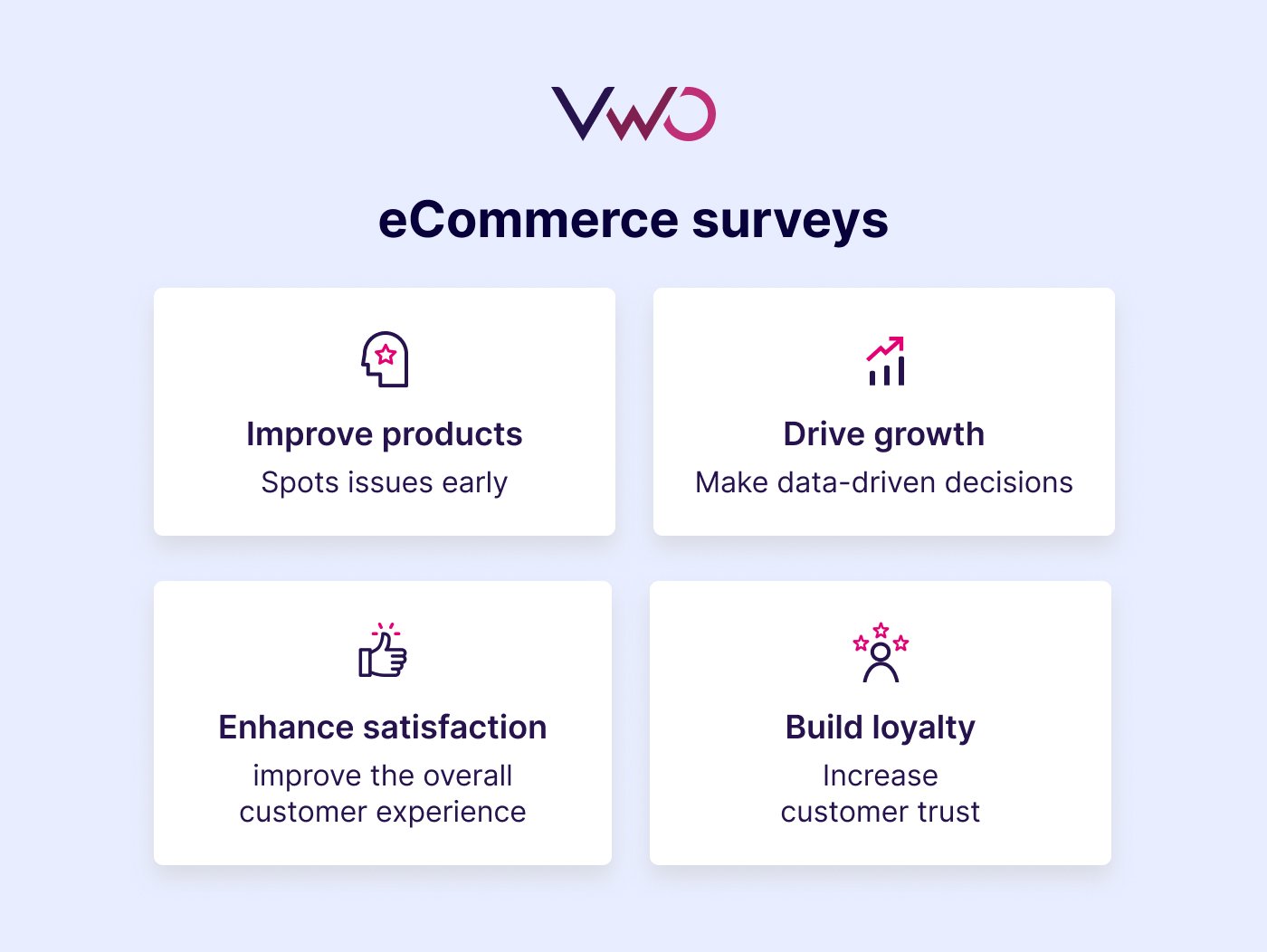
In a world where online shoppers have endless choices, conducting eCommerce surveys gives businesses something invaluable: a direct line to their customers’ thoughts and a deeper understanding of the customer journey from first click to repeat purchase.
They turn real customer feedback into clarity about what’s working, what’s not, and what could improve the buying experience. When used well, these insights fuel smarter decisions, happier customers, and stronger brand loyalty.
Refine products and services
- Spot weak points: Honest feedback helps you uncover the friction customers face, from slow checkouts to confusing product details or delayed deliveries.
- Shape future offerings: Insights gathered through surveys often spark new product ideas and let you test new concepts and features directly with shoppers, reducing the risk of investing in products customers don’t want.
- Fine-tune what you already sell: When customers share what they enjoy or find lacking, you can make focused improvements that enhance product quality, satisfaction, and overall value.
Strengthen strategy and growth
- Base decisions on real data: eCommerce surveys replace assumptions with evidence. They reveal exactly how customers think and behave, helping you track metrics such as customer satisfaction scores and your Net Promoter Score (NPS) to steer your business with confidence.
- Sharpen marketing impact: Learn which channels, messages, or offers truly connect with your audience and tailor your campaigns for higher engagement.
- Lift conversions: When you understand why shoppers hesitate or abandon their carts, you can redesign experiences that make buying easier and more intuitive.
- Build deeper trust: Running a quick customer satisfaction survey and acting on the results demonstrates to customers that their opinions matter, thereby strengthening trust and loyalty over time.
- Enhance service quality: Survey insights help your customer service representatives address recurring concerns and anticipate customer needs before they escalate into complaints.
- Turn buyers into advocates: A smoother, more satisfying experience strengthens customer loyalty, encouraging customers to share positive reviews and recommend your brand to others.
Types of eCommerce survey questions
Knowing what type of question to ask (and when) helps you collect more focused, actionable feedback.
Broadly, eCommerce surveys include a mix of the following question types:
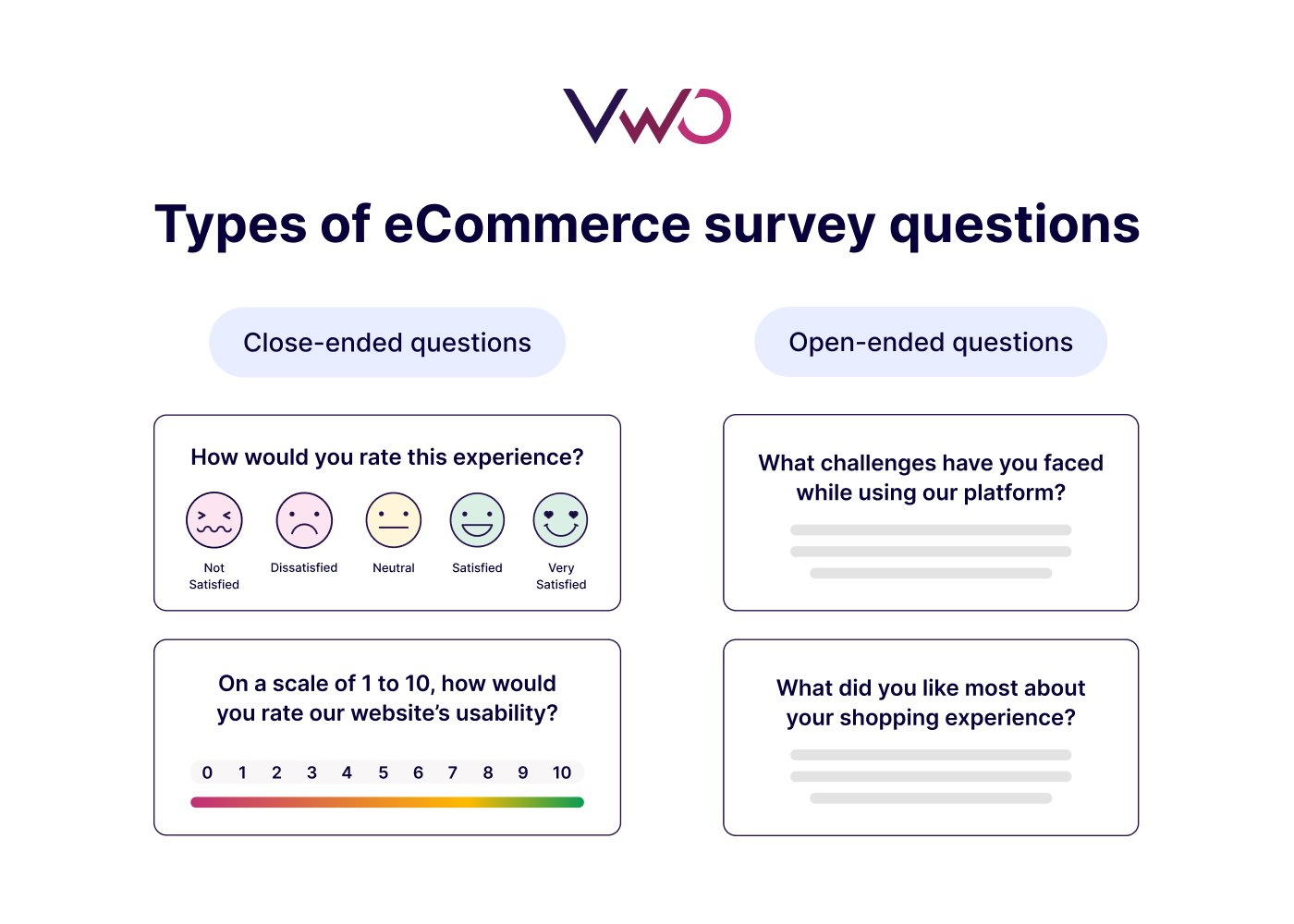
Close-ended questions
Close-ended questions provide predefined answer choices, making them ideal for collecting quantitative data that’s easy to analyze and compare over time. They can take several forms:
- Multiple-choice questions: Offer a list of fixed options for respondents to choose from.
Example: Which factor influenced your purchase most? (Price / Product range / Reviews / Delivery time) - Checkbox questions: Allow respondents to select more than one applicable option.
Example: Which of the following best describes why you shop with us? (Quality / Price / Delivery speed / Customer service) - Rating or Likert-scale questions: Measure the strength of customer sentiment or agreement.
Example: I found the checkout process easy to complete.
(Strongly agree / Agree / Neutral / Disagree / Strongly disagree)
These questions help you measure customer satisfaction, identify performance trends, and gather numeric insights for data-driven decisions.
Open-ended questions
Open-ended questions invite customers to express their thoughts in their own words, providing qualitative insights that explain the why behind their actions.
They’re especially useful for discovering new ideas, pain points, or unmet needs.
Example:
- What did you like most about your shopping experience?
- How could we improve our delivery process?
VWO lets you link survey responses with session recordings of those same users. Watch what they did before and after answering to understand the real “why” behind their feedback and pinpoint where friction truly exists.
eCommerce survey questions
The right eCommerce survey questions reveal the stories behind your data, helping you understand the emotions and motives behind every purchase.
Each stage of the customer journey, from browsing to post-purchase, offers a unique opportunity to listen, learn, and act.
Below, we’ve grouped the most useful survey questions for eCommerce businesses by purpose, so you can design feedback forms that capture meaningful customer insights.
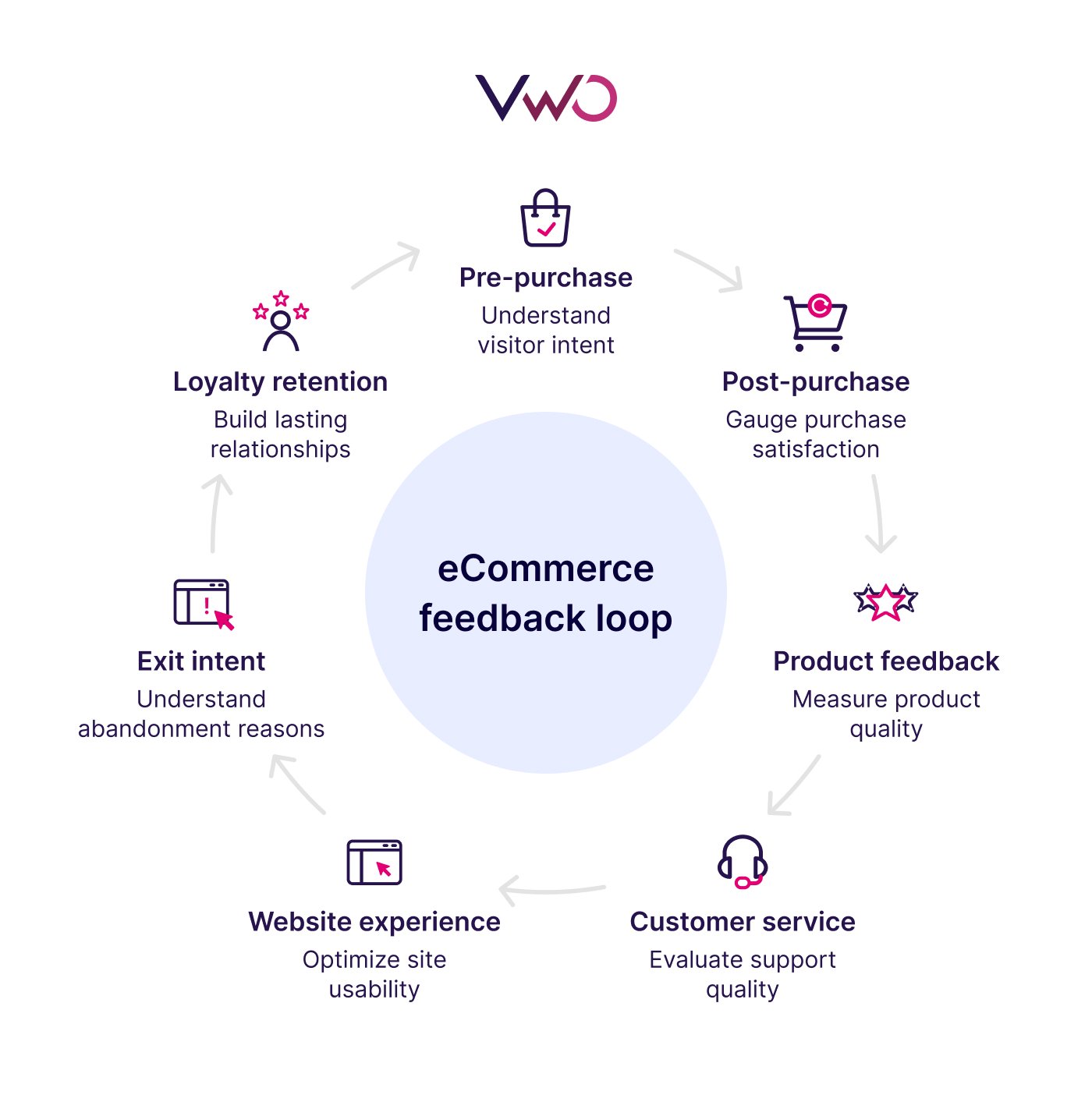
Pre-purchase survey questions
These questions help you understand what attracts visitors, what they’re looking for, and what might be holding them back from buying.
- What brought you to our website today?
- How did you first hear about our brand?
- Were you able to find the product you were looking for?
- How clear and detailed was the information on our product pages?
- What would make you feel more confident about purchasing from us?
- Was there anything that made you hesitate before adding items to your cart?
- Did you compare our products with other brands before visiting?
- How would you describe your overall first impression of our website?
- On a scale of 1–10, how likely are you to continue browsing today?
Post-purchase survey questions
Post-purchase feedback is essential for evaluating how customers felt after completing a transaction and whether their experience matched expectations.
- How satisfied are you with your recent purchase?
- How easy was it to place your order?
- Did our checkout process feel smooth and intuitive?
- Was your preferred payment method available during checkout?
- Was there anything confusing or frustrating about completing your order?
- How quickly did you receive your order confirmation?
- Did you feel confident that your payment information was secure?
- What was the one thing you liked most about your purchase experience?
- How likely are you to recommend us to a friend or colleague?
- Is there anything we could have done to make your purchase experience better?
Product feedback questions
These eCommerce customer survey questions focus on the product quality, value, and ability to meet customer expectations.
- How would you rate the quality of the product you received?
- Did the product match the description and images on our website?
- What did you like most about this product?
- How satisfied are you with the value for money?
- Did the product packaging feel premium and secure?
- Is there anything you’d like us to improve or change?
- How likely are you to repurchase this product in the future?
- How often do you use the product you bought?
- Would you recommend this product to others? Why or why not?
Shipping and delivery questions
Reliable delivery can make or break a sale. 50.6% of shoppers buy online for free shipping, while nearly 70% abandon their carts due to unexpected costs or slow delivery.
These eCommerce survey questions help you uncover how customers perceive your fulfillment process and where it needs improvement:
- Was your order delivered on time?
- Was the packaging secure and damage-free?
- Did the delivery updates or tracking information keep you informed?
- Would you rate our delivery speed as satisfactory, fast, or slow?
- How would you rate your overall delivery experience?
- Were there any unexpected delivery delays or issues?
- Did you find it easy to contact support regarding your delivery?
- How likely are you to order again based on this delivery experience?
- What could we do to improve our shipping process?
Customer service questions
These help assess how effectively your customer support team resolves issues and communicates with customers.
- How easy was it to contact our support team?
- How quickly did you receive a response?
- Was your issue resolved to your satisfaction?
- How would you rate the professionalism of our team?
- Did our team seem knowledgeable about the product or issue?
- How friendly and approachable was the representative?
- Did our team provide any proactive solutions or follow-ups?
- How satisfied are you with the overall support experience?
- What can we do to make our customer service better?
Website experience questions
These eCommerce website survey questions uncover friction in navigation, design, and usability across devices.
- How smoothly were you able to navigate through our website?
- Was the website layout intuitive and user-friendly?
- How quickly could you find the product or information you were looking for?
- Did you encounter any slow-loading or unresponsive pages while browsing?
- Was the product search or filter feature helpful?
- Did the visuals and product images meet your expectations?
- How would you rate your overall mobile browsing experience?
- Did you face any issues during the checkout process?
- Was the product comparison or recommendation feature useful?
- What improvements could enhance your overall browsing experience on our site?
Exit-intent survey questions
Exit-intent surveys capture insights from visitors who leave without completing a purchase, helping you reduce abandonment and improve conversion rates.
- What stopped you from completing your purchase today?
- Did you find our pricing reasonable for the value offered?
- Was there a specific reason you decided not to buy right now?
- Would a discount or limited-time offer have changed your decision?
- Did you encounter any technical issues while shopping?
- Did you find our return or refund policy clear enough?
- Were you looking for a different payment or delivery option?
- How would you rate your experience before leaving our site?
- What could we improve to encourage you to return?
Loyalty and retention questions
These surveys focus on understanding long-term satisfaction and what keeps customers coming back.
- What made you choose to shop with us again?
- How likely are you to make another purchase in the next 3 months?
- What do you appreciate most about our products or brand?
- What keeps you loyal to our store over competitors?
- How satisfied are you with our rewards or loyalty program (if applicable)?
- Have you recommended our brand to others?
- How would you describe your overall relationship with our brand?
- What would make you even more likely to shop with us again?
- Would you be interested in early access, exclusive offers, or product previews?
- How can we make your experience more personalized in the future?
Tips for creating effective survey questions
Knowing the right survey questions to ask can unlock powerful insights, but only if they are written with clarity and intent. The goal is to make your questions easy to answer, unbiased, and purposeful. Here’s how to get it right.
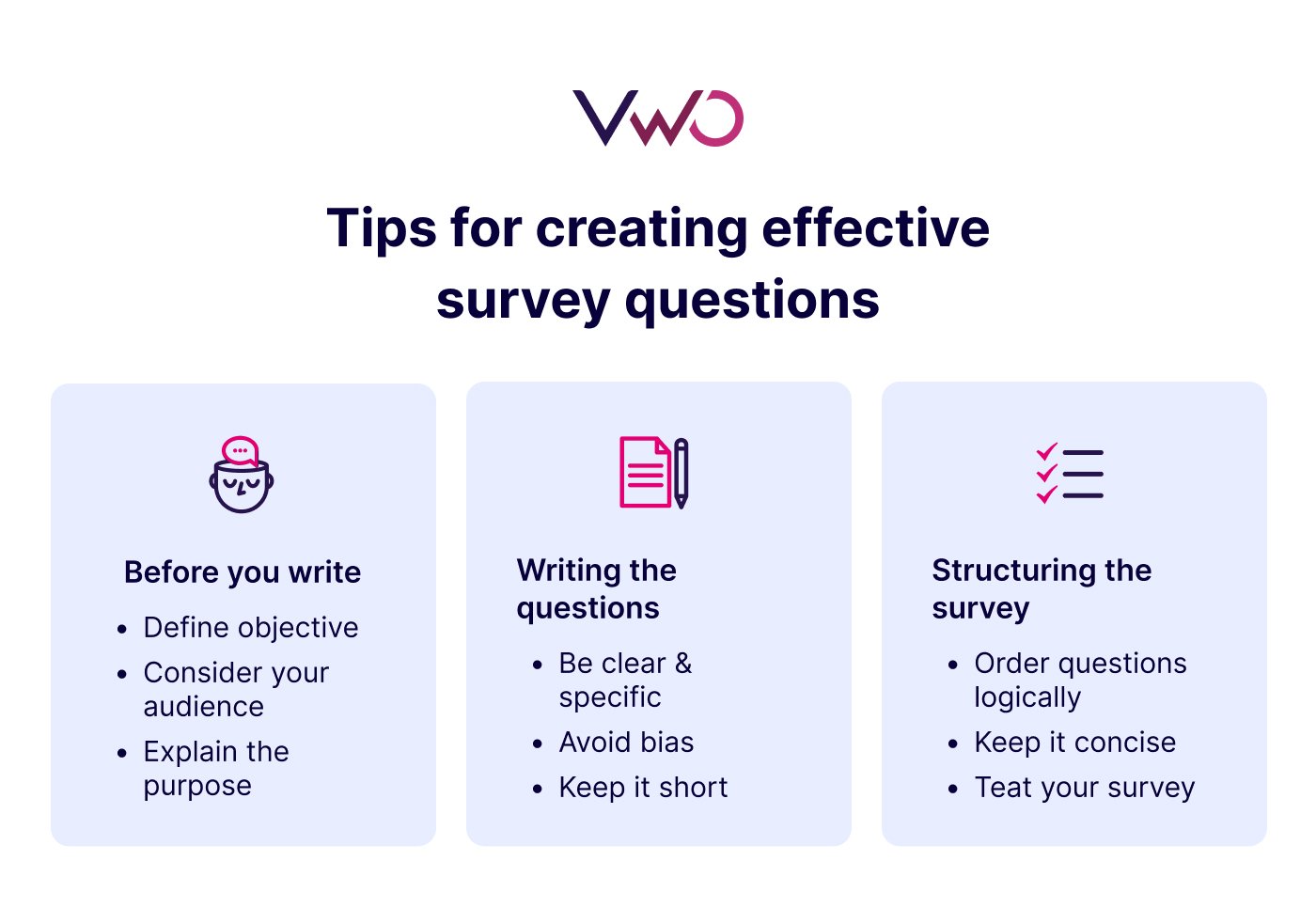
Before you start writing
- Set clear goals: Decide exactly what you want to learn: customer satisfaction, product feedback, or checkout issues, and build questions around that goal.
- Know your audience: Speak your customer’s language. If you’re surveying first-time shoppers, use everyday terms instead of technical or internal jargon. The simpler the language, the more accurate your responses will be.
- Explain the purpose: Start with a short note about why you’re asking for feedback and how it will be used. Transparency builds trust and boosts completion rates.
Writing the questions
- Keep questions short and precise: Use simple, direct phrasing. One clear question is always better than a long or vague one.
- Avoid leading or loaded language: Stay neutral. Instead of asking, “How much did you enjoy our fast delivery?”, try “How satisfied are you with the delivery time?”
- Ask one question at a time: Steer clear of “double-barreled” questions like “How satisfied are you with our product and customer service?” Split it into two separate items for cleaner data.
- Use a mix of question types: Pair closed-ended questions for measurable data and open-ended ones for deeper insights.
- Offer balanced response options: For scales and ratings, provide symmetrical options (e.g., “Very satisfied” → “Very dissatisfied”) so respondents can express both positive and negative experiences equally.
- Include flexible answers: Add options like “Other” or “Not applicable” to make your survey inclusive and avoid forcing inaccurate responses.
Structuring the survey
- Arrange questions in a logical flow: Start with easy questions, then move to more detailed or personal ones. This keeps respondents engaged.
- Keep the survey brief and transparent: Limit to about 5–10 questions or under ten minutes. Tell respondents the estimated time upfront.
- Respect respondent choice: Let people skip questions if they prefer. It shows respect and keeps completion rates high.
- Test and refine before launch: Run a quick test with your team or a small customer group to spot confusing wording or layout issues.
VWO surveys: The AI-powered way to listen, learn, and optimize
In 2026, feedback tools need to be as intelligent as your customers, and VWO Surveys delivers exactly that. It helps businesses collect and analyze real-time user feedback through on-page surveys, so you understand what users think, why they hesitate, and where friction holds them back.
VWO Copilot, your AI-powered survey assistant, makes everything faster and sharper from start to finish.
AI-generated survey questions:
Simply define your goal, whether it’s identifying customer pain points, validating product ideas, or improving checkout flow, and the AI instantly generates tailored questions you can refine in seconds. Don’t like the first set? Regenerate as many times as you like until the questions perfectly match what you want to learn.
AI-summarized survey reports:
Copilot automatically reviews every response and extracts themes, sentiment, and key comments into a clear summary. It highlights what truly matters and why, so insights are instantly digestible. You also get specific recommendations on what to improve next. No more scrolling endlessly through open-text answers.
Apart from this, VWO uses smart triggers to make surveys feel natural rather than intrusive. They appear at the right moment based on time on page, scroll depth, or exit intent, so every response comes with real context.
Conditional logic tailors questions based on each person’s answers, while pre-built templates, branding options, and multilingual support help you engage every audience across the globe.
Watch this quick video to see how effortlessly you can set up your first VWO survey and capture real feedback.
VWO goes beyond data collection by connecting survey insights to behavior analytics and experimentation. You can integrate findings with VWO Testing and VWO Personalize to turn feedback into live experiments and targeted user experiences.
Request a demo to experience all the on-page survey features offered by VWO.
FAQs
In an exit-intent survey, ask questions that uncover why visitors are leaving, such as why they’re abandoning their cart or not completing a purchase. Include short questions about potential issues like unclear pricing, slow delivery estimates, or a complicated checkout process, and invite suggestions on how the site could be improved.
Keep your eCommerce survey between 5 and 15 minutes, with 10 minutes as a good target for balanced insights and completion rates. For quick satisfaction surveys, aim for 3–5 minutes or up to 15 concise questions to avoid fatigue.

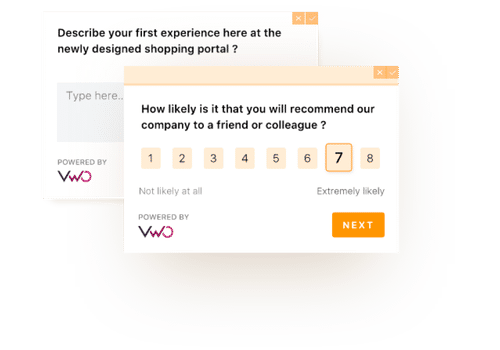


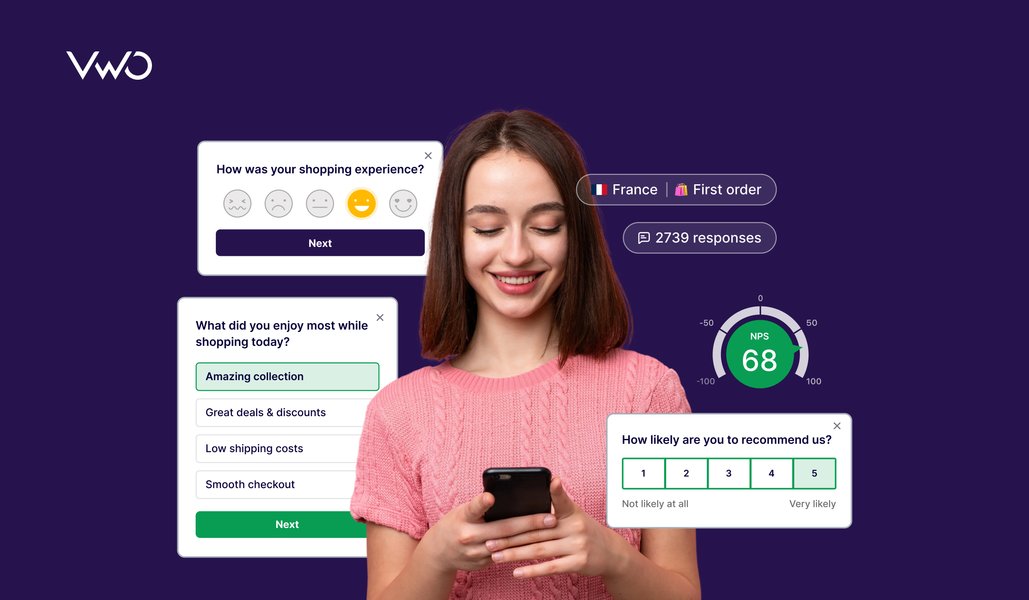
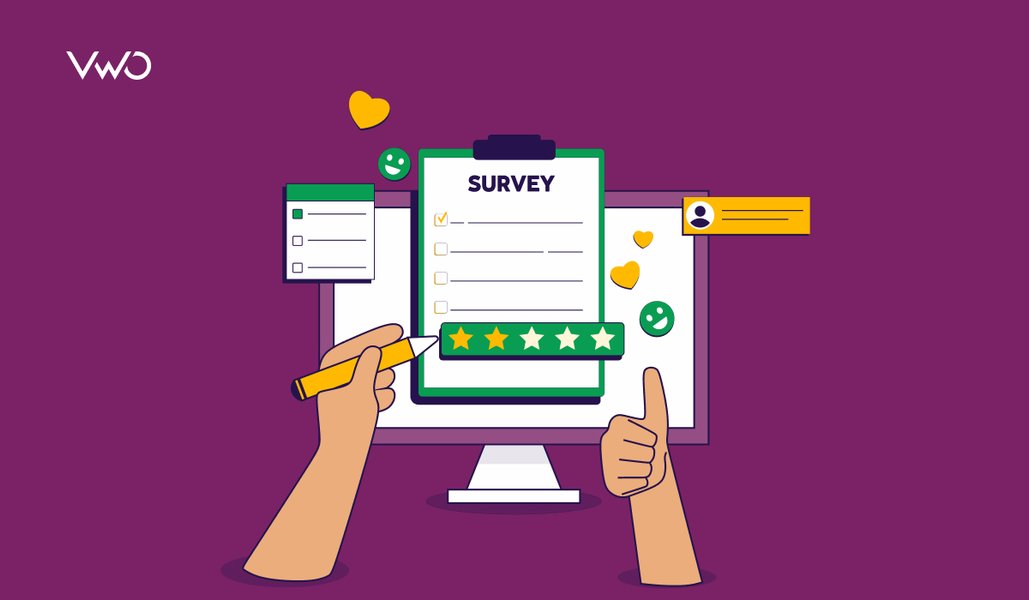
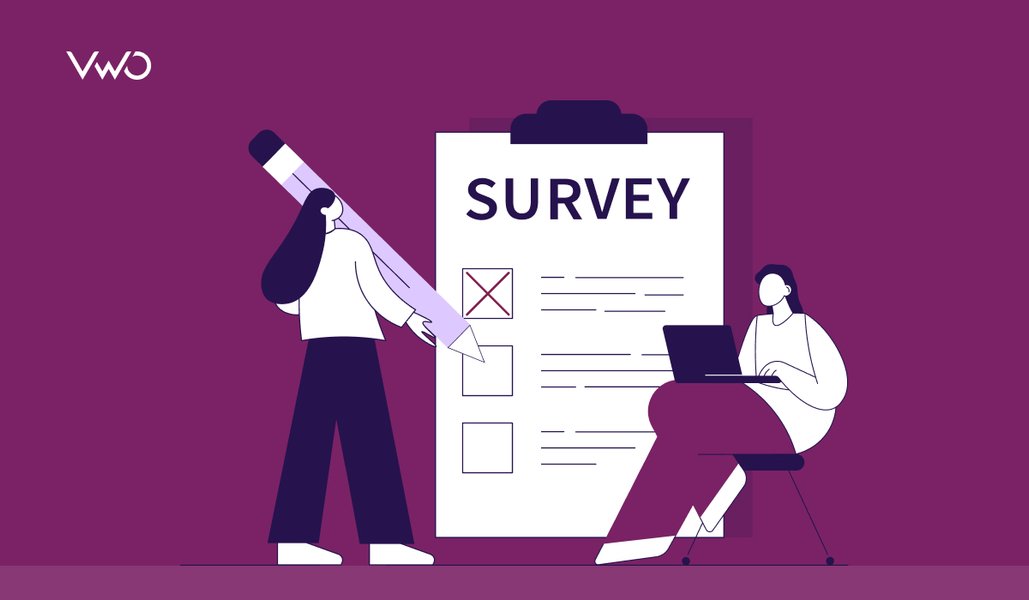
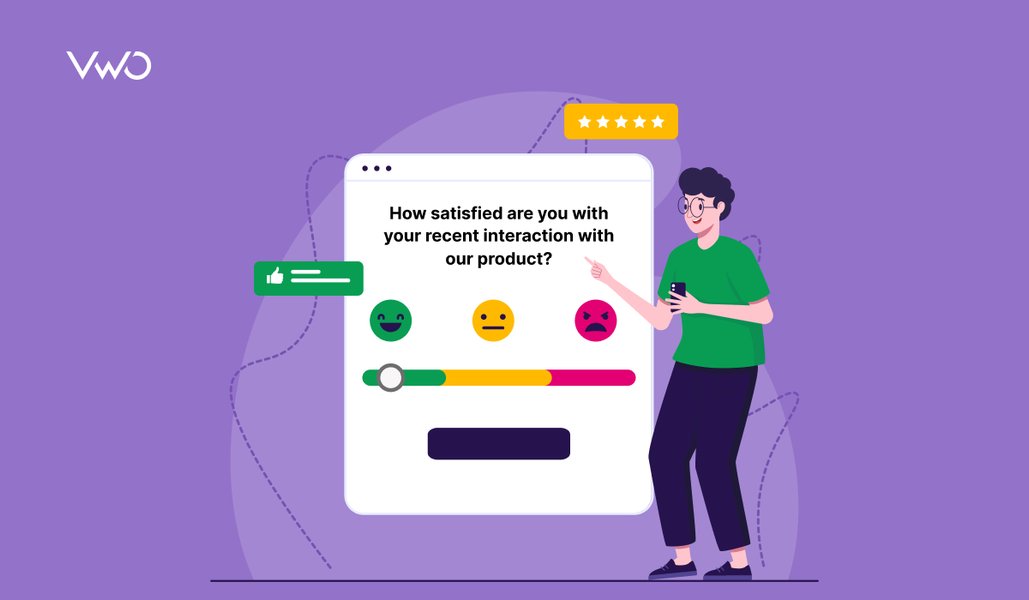
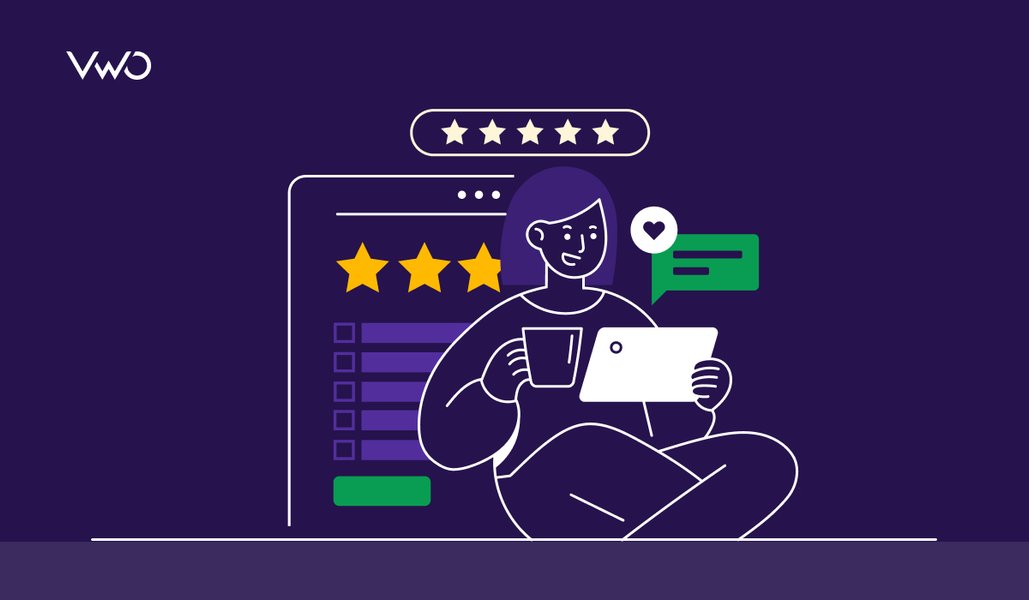
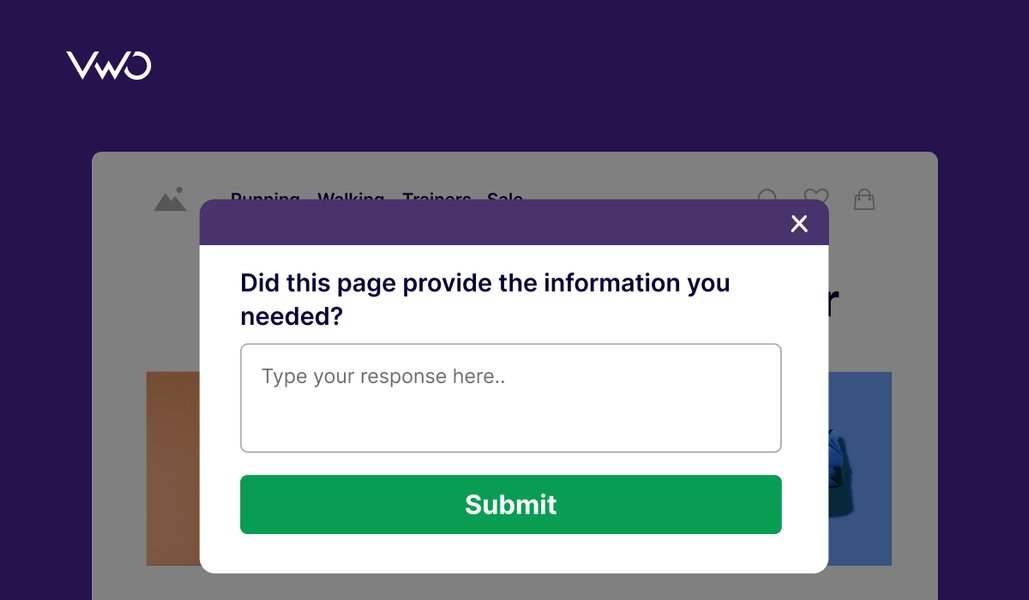
![What Is Net Promoter Score (NPS)? How to Measure and Use It [Complete Guide]](https://static.wingify.com/gcp/uploads/sites/3/2025/11/Feature-image-What-Is-Net-Promoter-Score-NPS_-How-to-Measure-and-Use-It-Complete-Guide-1.jpg?tr=h-600)











